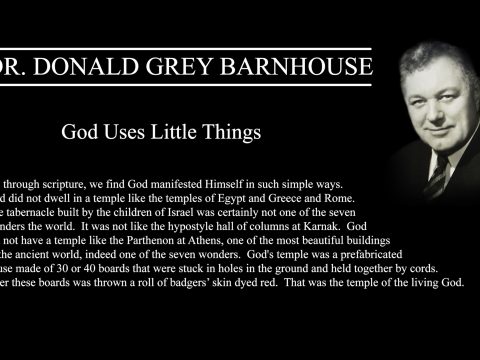True joy cannot belong to the unsaved man. He may know a temporary calmness. But it is as the delight of the narcotics’ dream and must give away to the ultimate of eternal ravings of the lost.Naturally, it is impossible for a man to know true joy until the burden of sin has been removed from his soul. There are those who have plenty of mirth, but no joy. There are those who have a counterfeit peace, but it is as a stagnant pool, not the fresh flowing stream. It is necessary for us to be born from above in order to know that we have peace with God.
Some years ago, the late Thomas Edison gave an interview to reporters in which he stated that he had never met a man who was really happy. Some of us wonder at the time if Edison had ever met a Christian. It’s obvious that when we say this we must define our terms for there are many people professing to be Christians who are not Christians. And there are many who are professing Christians who are not joyful Christians. A Christian in the Bible’s sense is not one who has joined the church or who has been baptized or who has followed a system of ethics or who honors the name of Christ. It is true that many real Christians have done and do all these things, but it is also true that many people do some or all of these things without ever becoming a Christian.
A Christian is a person in whom a supernatural work has been done. It is not a work that man can do, but a work which God must do. God says that we must be born from above. This being born from above is the implantation of a new life, which we did not before possess. God comes to the individual with a demand and with the power of supply. He demands the possession of the perfection equal to His own. We do not have that perfection. We are less perfect than Christ, which means we are sinners and therefore under condemnation. Before we can stand before God, we must admit that there is nothing that we can furnish Him that could ever satisfy His righteous demand. But once we admit this sinful position that has brought us into the place where we deserve His punishment, He shows us the cross of Jesus Christ. And through the grace that flowed from the death of our substitute, to give to us as a free gift, all of holiness, righteousness, and judicial standing, which perfection requires of us.
Now as soon as this has occurred, we then have the right to call ourselves Christians. No one else in the world has this right. We have believe God’s verdict about our lost condition. We have believe God’s verdict about the eternal satisfaction of the death of our Savior. Then, God has given us the gift of eternal life. We have become that which we were not. We have the supernatural life of the risen Lord Jesus. True joy cannot belong to the unsaved man. He may know a temporary calmness. But it is as the delight of the narcotics’ dream and must give away to the ultimate of eternal ravings of the lost.
Formerly, I was confused when some who were not Christians told me that they were perfectly happy. I wondered at the apparent discrepancy between their testimony and that of the Word of God, which says that “the unsaved are like the troubled sea when it cannot rest, whose waters cast up mire and dirt. There is no peace, for the unsaved” (Isaiah 57:20). Now let God be true and every man a liar (Rom 3:4). For as my contacts to the unsaved grew wider and I began to see the definite conversions of many who had greatly resisted the truth. I heard them confessed that they had not told the truth when they had professed to be happy. We know how possible such a condition is. Almost every community of the nations have been shocked by the suicide of someone whose outward life seemed happy and whose position seemed beyond the encroachment of care. But underneath, there had been a smoldering fire. There was no happiness there. And certainly, there was no deep joy.
We must also admit that there are those who are authentic Christians who are not fully joyful. The reason for this is evident when we consider the nature of being a Christian. A Christian has a normal, natural life like all non-Christians. And a Christian also has a supernormal, supernatural life which is God-given. These two can be in bitter conflict with one another. Draw upon the wildest of imaginings of literature and you cannot rival the conflict which may take place in the heart of a born-again believer who is refusing to give the dominant place to the new life. Stevenson’s Dr. Jekyll and Mr. Hyde in the darkest moments of the inner tragedy of the being, cannot compare to the seventh chapter of Paul’s epistle to the Romans, where he describes the conflict between the two natures that dwelt within him. The old Saul of Tarsus and the new Paul, which was the life of Christ. Now this was a familiar truth back in the old testament, Jacob the swindler and Israel the prince with God wrestled within one man. The Lord indicated that some Christians would not be fully joyful, even though He had made full provision for their happiness. For not only did He say to sinners, “come unto me, and I will give you rest,” but also He said to those who had come to Him for this first rest, “take my yoke upon you and learn of Me and you shall FIND rest for your soul.”
Now this message to you must have within it, that same double call. To you who are not saved, there is the marvelous offer of the removal of sin’s penalty. To those who know that they have come to the cross, and have received full pardon for their sinful nature, there is a further call to the very peace of God that surpasses all understanding that He gives to those of His own who are willing to walk the whole way under His guidance.
I wish to make clear this difference between the unsaved and the believer in Christ. For among those who listen today, there are undoubtedly many who have not been born again and I would not want that they be deceived by the message of the possibility of joy and happiness that I am about to bring to believers. There must be no one who has not accepted Jesus Christ as their savior, who shall think that it is possible for him to know true joy until he has come to Christ. That’s why it’s so important that you should recognize the fact that you are not born again, that all the positive thinking in the world can do nothing for you. You may churn yourself into a dither of positive thinking, but it will get you nowhere in the final analysis. You must be born again.
Now, for those of you who have accepted Jesus Christ, but who do not experience the joy that He gives, or to those who have once possessed that joy and have lost it, there is a sure highway to a satisfied life; and that is to realize that all joy must be found in Christ and that we must surrender to Him.
There’s a very simple story that I’ve told many times during the past quarter of a century that illustrates one phase of my meaning. An Irishman was coming to America years ago, and he had reached Liverpool where he is to embark on a journey. He fingered the few shillings which made up his total earthly capital, and he decided that he would economize on the trip in order to have more money remaining when he reached New York. He went therefore to a small store, and bought a supply of crackers and cheese. He had managed to get by the days at sea he thought and would be none the worse for his restricted rations. But as the voyage progressed, the sea air made him very hungry. To make matters worse, the dampness in the air made his crackers soft and his cheese hard. He was almost desperate with hunger and to cap the climax, he caught the fragrant whift of the food on a tray which a steward was carrying along the deck to another passenger. The hungry man made up his mind that he would have one good square meal, even though it would take several of his shillings. He awaited the return of the steward and asked him how much it would cost to go to the dining room and get a dinner. The steward was amazed and asked him if he had a ticket for the steamship passage. Well of course the man had his ticket. And so the steward told him that the meals were all included with the ticket. Oh the poor man could have saved the money he spent on crackers and cheese and could have gone to the dining room and eaten as much as he liked and at each mealtime!
Now this is a humble picture of the position of many people who have believed in Christ as savior. Crackers-and-cheese Christians. Because of that faith which they have in Christ, they are saved, but they go on their miserable way without appropriating any of the blessings that God has for them. Oh how terrible is the responsibilities of these crackers-and-cheese Christians who show no joy to those who are looking for the reality of joy in life. Such Christians cannot show it because they do not have it, yet it was all provided for them. “He that spared not His own Son, but delivered Him up for us all, How shall He not also freely give us all things?” (Rom 8:32).
When Christ hung on the cross, He not only made provision for the removal of sin, but also for the indwelling presence of the Spirit in the heart. For joy unspeakable and full of glory. For peace that surpasses all understanding. For strength to make us more than conquerors. In short, He blessed us with all spiritual blessings. Now if you do not have these joys, you are not getting out of Christianity that which God desired you to have. God describes the attitude of his children in the midst of life. We read the following paragraph in the Word of God, “Giving no offence in any thing, that the ministry be not blamed: But in all things approving ourselves as the ministers of God, in much patience, in afflictions, in necessities, in distresses, in stripes, in imprisonments, in tumults, in labors, in watchings, in fastings; By pureness, by knowledge, by longsuffering, by kindness, by the Holy Ghost, by love unfeigned, by the word of truth, by the power of God, by the armor of righteousness on the right hand and on the left, by honor and dishonor, by evil report and good report: as deceivers, and yet true; as unknown, and yet well known; as dying, and, behold, we live; as chastened, and not killed; as sorrowful, yet always rejoicing; as poor, yet making many rich; as having nothing, and yet possessing all things” (2 Cor 6:3-10).
Yes, all these things are possible in the believer. Yielded to our Lord, He will live this life of paradoxes in us. We can have a story to tell to people so wonderful that it will seem too good to be true. In the times in which we live, it is well for us to concentrate our thinking on some definite phases of the possibilities of the Christian life. We’re told that we’re to be sorrowful, yet always rejoicing. Poor, yet making many rich. As having nothing, and yet possessing all things.
Now the world knows what it is to be sorrowful without rejoicing. Christians know what it is to be sorrowful, and yet rejoicing. We are sorrowful because we see the world as it is. We know that there are terrible moral and social wrongs that grip this world today. We are not blind to these miseries. We know the terrible conditions that exists in many parts of the world, where millions and hundreds of millions of people who work for a mere pittance today with starve minds, souls, and bodies. We know that in many parts of the world, men are working for a fraction for what they really earn. And mothers starve in order to give more to the child. We know that our sin cursed society is responsible for these things. We’re aware of what goes on in the slums of our great cities – the desperate condition that exist. Now the Christian who is worthy of the name has his spirit oppressed and his soul filled with sorrow for these things, even though his heart is rejoicing in the knowledge that these conditions shall not last forever.
We do not advocate the overthrow of the existing order of things, though we know that there are many injustices in the system that should be removed, because we know that the system itself will be changed when Jesus Christ comes again and forces the establishment of righteousness upon the earth. We’re sorrowful, because we see the judgment that must fall upon the earth. We read Word of God and we find Him saying “Go to now, you rich men, weep and howl for your miseries that shall come upon you. Your riches are corrupted, and your garments are moth-eaten. Your gold and silver is cankered; and the rust of them shall be a witness against you, and shall eat your flesh as it were fire. You have heaped treasure together for the last days. Behold, the hire of the laborers who have reaped down your fields, which is of you kept back by fraud, cries: and the cries of them which have reaped are entered into the ears of the Lord. You have lived in pleasure on the earth, and been immoral; you have nourished your hearts, as in a day of slaughter. You have condemned and killed the just; and he does not resist you” (James 5:1-6).
Now the true Christian is sorrowful, because he sees the misery on the one hand and the exploitation on the other, but he’s always rejoicing because he knows there is soon to be an end to these things. Does not the word of terrible indictment we have just quoted end with a great promise? “Be patient therefore” (verse 7). Think of that word, “therefore”. Because of all the misery? Because of all the exploitation we’re to be patient? But how long Lord? The answer comes clear and strong from God’s revelation of truth, “Be patient therefore brethren, unto the coming of the Lord. Be also patient and establish your hearts for the coming of the Lord draws near” (verse 8).
Yes, the Christian is sorrowful, yet always rejoicing. He sees the world’s miseries, but he sees the answer of God — Jesus Christ is coming. He who has redeemed us by his precious blood and who still prolongs His day of patience waiting perhaps for you to turn and accept Him as your own. That you might not be lost, but that you might be with Him.
We are always rejoicing in the midst of world’s difficulties, because we know God and what He is. Dr. Pusey, the celebrated Anglican, had several good rules for being happy. Among them were these, “Never allow yourself to complain of anything, even the weather, for God rules over all for good; never dwell with dread upon tomorrow, God will be then as much as now.” Another man when asked how he always seem joyful answered that he had learned to look three ways. First he looked up to heaven, that he might remember that he was going to spend eternity there. Second, he looked to the earth, that he might remember that one day, his body would return to dust, stripped of all earthly possessions. And third, he looked within his heart, that he might realized how many people were worse off than he was.
Now the Christian must not forget that worrying is sin. He must be sorrowful, yet always rejoicing. If he is worrying, he is denying the care of God over his life. He has been given a peace and a joy that are full. One other thing that we must remember as Christians in these days of difficulties through which the world is passing is the next clause in the verse, “as poor, yet making many rich.” There are comparatively few Christians that are rich in the material things of this world. God tells us that not many wise men after the flesh, not many mighty, not many noble are called, but God has chosen the foolish things of the world to put to confound the wise, and God has chosen the weak things of the world to confound the things which are mighty; and the base things of the world and the things which are despised God has chosen, and the things which are not, to bring to nothing the things that are, that no flesh should glory in His presence. No matter how little we have, if we have Christ, we have everything.
How often we hear people tell what they would do if they were rich. But it’s not always those who have the most who can do the most. Peter and John when asked for alms by a certain man lame from his mother’s womb, were forced to reply, “Silver and gold have I none, but such as I have I give to thee. In the name of Jesus of Nazareth, rise up and walk. And he took him by the right hand and lifted him up, and immediately his feet and ankle bones received strength. So he, leaping up, stood and walked and entered the temple with them — walking, leaping, and praising God. And all the people saw him walking and praising God” (Acts 3:1-9). You, who can bring spiritual riches to those about you who are in such great need. There have been times when the poor starved and the rich were miserable enough to commit suicide. But it was because they were all looking at riches from the wrong viewpoint. What the world call riches is not necessarily riches. I read somewhere of a newspaper contest for the definition of the meaning of money. One of the published answers was this, “Money is a universal provider for everything but happiness, and a passport everywhere but heaven.”
God tells us that we are to come to him without money and without price. You who have Christ, have so much to give to those around you. There was a girl who met the late Fancis Ridley Havergal, the well-known hymn writer, for just a brief moment. The girl said later that seeing the face of this wonderful woman was the means of conversion. “Oh I’m so glad,” she said that I saw just once, that God-satisfied face. That means much more than a smiling face. You can find a smiling face in any movie or in any subway train, but you cannot always see God-satisfied faces.
The conclusion of this message must once more be a call to the Christian and one to the unsaved. To Christians, the call is one to yieldedness to the mastery of Christ, that He may give you all joy and cause that joy to flow through you to the lives of others. To the unsaved, the call is to an acceptance of God’s verdict about your sinful condition and about the eternal satisfaction of the death of Christ. Joy is waiting for all those who will come to God and receive it in His way.
Dr. Donald Grey Barnhouse



